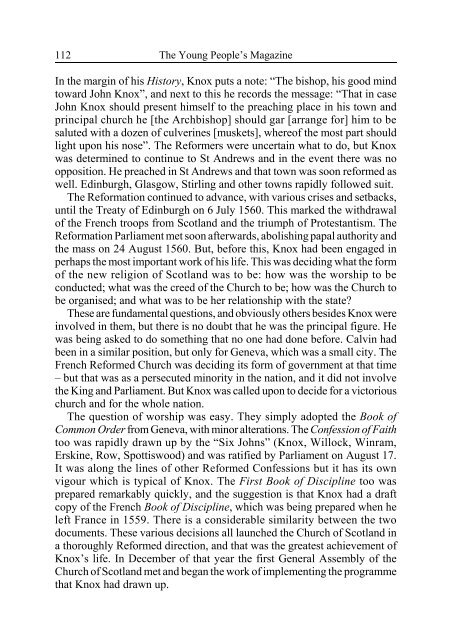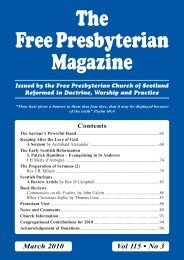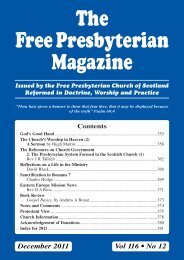June - the Free Presbyterian church of Scotland
June - the Free Presbyterian church of Scotland
June - the Free Presbyterian church of Scotland
Create successful ePaper yourself
Turn your PDF publications into a flip-book with our unique Google optimized e-Paper software.
112<br />
The Young People’s Magazine<br />
In <strong>the</strong> margin <strong>of</strong> his History, Knox puts a note: “The bishop, his good mind<br />
toward John Knox”, and next to this he records <strong>the</strong> message: “That in case<br />
John Knox should present himself to <strong>the</strong> preaching place in his town and<br />
principal <strong>church</strong> he [<strong>the</strong> Archbishop] should gar [arrange for] him to be<br />
saluted with a dozen <strong>of</strong> culverines [muskets], where<strong>of</strong> <strong>the</strong> most part should<br />
light upon his nose”. The Reformers were uncertain what to do, but Knox<br />
was determined to continue to St Andrews and in <strong>the</strong> event <strong>the</strong>re was no<br />
opposition. He preached in St Andrews and that town was soon reformed as<br />
well. Edinburgh, Glasgow, Stirling and o<strong>the</strong>r towns rapidly followed suit.<br />
The Reformation continued to advance, with various crises and setbacks,<br />
until <strong>the</strong> Treaty <strong>of</strong> Edinburgh on 6 July 1560. This marked <strong>the</strong> withdrawal<br />
<strong>of</strong> <strong>the</strong> French troops from <strong>Scotland</strong> and <strong>the</strong> triumph <strong>of</strong> Protestantism. The<br />
Reformation Parliament met soon afterwards, abolishing papal authority and<br />
<strong>the</strong> mass on 24 August 1560. But, before this, Knox had been engaged in<br />
perhaps <strong>the</strong> most important work <strong>of</strong> his life. This was deciding what <strong>the</strong> form<br />
<strong>of</strong> <strong>the</strong> new religion <strong>of</strong> <strong>Scotland</strong> was to be: how was <strong>the</strong> worship to be<br />
conducted; what was <strong>the</strong> creed <strong>of</strong> <strong>the</strong> Church to be; how was <strong>the</strong> Church to<br />
be organised; and what was to be her relationship with <strong>the</strong> state?<br />
These are fundamental questions, and obviously o<strong>the</strong>rs besides Knox were<br />
involved in <strong>the</strong>m, but <strong>the</strong>re is no doubt that he was <strong>the</strong> principal figure. He<br />
was being asked to do something that no one had done before. Calvin had<br />
been in a similar position, but only for Geneva, which was a small city. The<br />
French Reformed Church was deciding its form <strong>of</strong> government at that time<br />
– but that was as a persecuted minority in <strong>the</strong> nation, and it did not involve<br />
<strong>the</strong> King and Parliament. But Knox was called upon to decide for a victorious<br />
<strong>church</strong> and for <strong>the</strong> whole nation.<br />
The question <strong>of</strong> worship was easy. They simply adopted <strong>the</strong> Book <strong>of</strong><br />
Common Order from Geneva, with minor alterations. The Confession <strong>of</strong> Faith<br />
too was rapidly drawn up by <strong>the</strong> “Six Johns” (Knox, Willock, Winram,<br />
Erskine, Row, Spottiswood) and was ratified by Parliament on August 17.<br />
It was along <strong>the</strong> lines <strong>of</strong> o<strong>the</strong>r Reformed Confessions but it has its own<br />
vigour which is typical <strong>of</strong> Knox. The First Book <strong>of</strong> Discipline too was<br />
prepared remarkably quickly, and <strong>the</strong> suggestion is that Knox had a draft<br />
copy <strong>of</strong> <strong>the</strong> French Book <strong>of</strong> Discipline, which was being prepared when he<br />
left France in 1559. There is a considerable similarity between <strong>the</strong> two<br />
documents. These various decisions all launched <strong>the</strong> Church <strong>of</strong> <strong>Scotland</strong> in<br />
a thoroughly Reformed direction, and that was <strong>the</strong> greatest achievement <strong>of</strong><br />
Knox’s life. In December <strong>of</strong> that year <strong>the</strong> first General Assembly <strong>of</strong> <strong>the</strong><br />
Church <strong>of</strong> <strong>Scotland</strong> met and began <strong>the</strong> work <strong>of</strong> implementing <strong>the</strong> programme<br />
that Knox had drawn up.

















